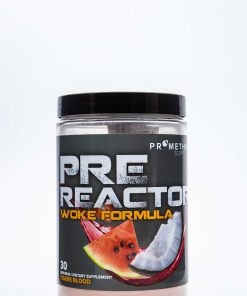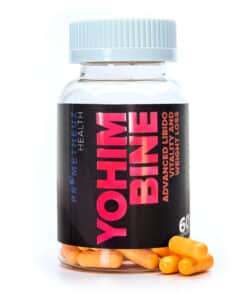Workouts
HOW TO PROPERLY USE PRE-WORKOUT
How to properly use Pre- Workout supplements to boost performance
Pre-workouts are a popular supplement when it comes to getting the extra edge during your tough workouts by maximizing energy and performance. It is also one of the most thoroughly researched supplements within the fitness and bodybuilding industry. Numerous studies have proved its effectiveness in terms of increasing training volume and boosting muscular endurance while reducing your levels of perceived effort during your workout. In the long run, this will theoretically lead to better muscular gain. Despite the ever-growing popularity of pre-workout, there seems to be a lack of information on how exactly to use pre-workout to maximize its effectiveness while minimizing any potential side effects.
What makes a pre-workout work?
Taking a quick look at any pre-workout label, you will be bombarded with a long list of almost unpronounceable ingredients. Some of these ingredients can indeed be very helpful with something like Trimethylglycine which aids in heart health and power output. You will also find Beta-alanine, which helps decrease fatigue, meaning you can possibly run longer or put in a few extra reps. Some will contain Nitric Oxide boosters, such as Citrulline and Arginine, helping you achieve a greater pump. Most definitely you will also find some form of creatine, an extremely popular supplement known for improving energy production during anaerobic activities.
Along with the mentioned ingredients, pre-workout supplements also have ingredients known as stimulants. Stimulants help the general purpose of increasing performance through heightening the physiological and mental factors such as heart rate, alertness, and vasodilation. You will most likely find a stimulant called Yohimbine, a substance found within a Yohimbine tree bark, that can improve blood flow and the utilization of fat for energy. However, the most effective and important stimulant in all pre-workout supplements is none other than caffeine. Caffeine is the most widely used stimulant in the world, and for good reason. Caffeine has the ability to inhibit the sleep-inducing effects of adenosine, and as such can influence factors such as wakefulness, alertness, aerobic capacity, power output, fat breakdown, and time to exhaustion. This is usually what causes the tingling and jittery sensation described following its consumption.
How often should you take pre-workout?
Even though the positive benefits and boost in energy given by pre-workouts might tempt you to consume it before every workout, it is best that you don’t. Many studies have shown that regular pre-workout intake can quickly cause you to be tolerant to the effects of caffeine. Meaning that the more often you take it, the more you will have to continuously increase the dose of your pre-workout in order to feel the benefits it offers during your workout. In fact, research has found that eventually, you will even reach something called an insurmountable tolerance to caffeine which means that increasing the dose of your pre-workout will no longer enable you to overcome your tolerance to it. Simply this means that when you have reached this point, ingesting a pre-workout will essentially be useless aside from any placebo effects it may provide.
Multiple studies have examined the effect of pre-workouts on workout performance and have actually found that it seems to provide a greater benefit for lower body workouts than upper body workouts. This is likely due to lower body exercises, in general, being harder and require more effort than upper body exercises. Since pre-workouts reduce your perception of effort, it gives you the extra boost needed during strenuous leg days, which otherwise may not be as necessary during upper-body days. Therefore, to avoid quickly becoming tolerant to the effects of your pre-workout, it would be wise to only use it during your lower body workouts where you feel you need the extra boost and as such help to prevent the benefit of your pre-workout diminishing throughout the weeks.
In addition, if you have been leaning on pre-workout for a while and have become noticeably tolerant to its effects, it would be wise to take a couple of weeks off any caffeine or gradually lower your daily intake in order to build back up the sensitivity of your body to the effects of caffeine.

How much of your pre-workout should you take?
The amount of pre-workout required to maximize its benefits depends on 2 things. Your current body weight and your current habitual caffeine intake. Most research in support of caffeine’s ergogenic effects on performance uses a dosage of roughly 3 to 6 milligrams of caffeine per kilogram of body weight and is therefore likely a good range to stay within for most people. Research has also shown that the closer your habitual caffeine dose is to your pre-workout caffeine dose, the less consistent the beneficial effects will become.
Regardless of this, if you are not consuming any caffeine or are not close to six milligrams per kilogram daily, or find yourself sensitive to caffeine in general, it is wise not to triple your caffeine intake immediately just to hit the recommended dosage. Try to start below this range and build your way up as needed and decrease the dosage if you feel you have experienced negative effects.
When should you take your pre-workout?
Finding the right time and balance when using a pre-workout can have a massive impact on the effectiveness. Taking pre-workout too early can cause the effects to diminish mid-workout. In contrast, taking pre-workout too late can cause you to not feel the full effects until later on in your workout. Most people agree effects of caffeine can be felt within 20 minutes of consumption. However, research shows that peak caffeine levels in the blood will be achieved more or less at the 60-minute mark. I would recommend taking your pre-workout or caffeine-containing supplement 45 minutes before you get to the gym so that by the time you have concluded your warm-up you should be ready to go. It is also important to consider that caffeine has a half-life of 3-5 hours, which is important in minimizing side effects and managing sleep. For example, a 2013 study done by the Journal of Clinical Sleep Medicine compared the effects of caffeine on sleep when ingested 3 hours or 6 hours before sleep. The research study found that when compared to a placebo, moderate caffeine consumption less than 6 hours before sleep reduced total sleep time by 41 minutes. Caffeine intake 3 hours before sleep reduced total sleep time by 63 minutes. In both conditions, it also took subjects more than double the time to fall asleep and significantly reduced sleep quality. This simply means if you don’t want to affect your sleep, which it is extremely important for muscle growth and recovery, it is best to refrain from taking it close to your bedtime.
When it comes to which supplements to take and the best workout supplements that are backed by science, pre-workout is definitely a top choice. Pre-workout can be a great tool on those long days when you feel you need that extra boost to get through a hard workout. However, it is always important to emphasize that any supplement compromises a very small piece of the puzzle as the majority of your results will be seen with implementing a proper training and nutrition plan.





